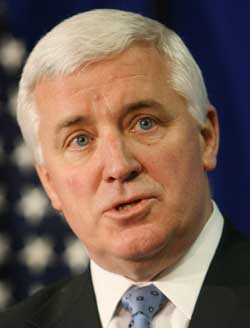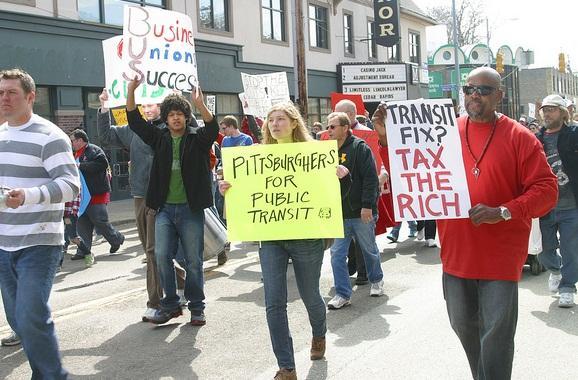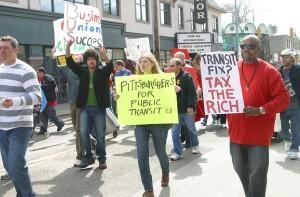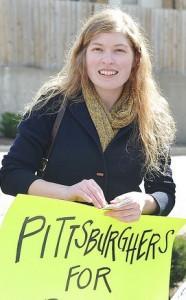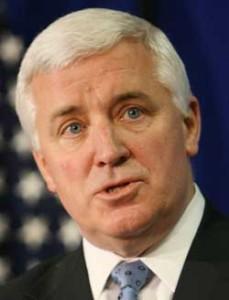 HARRISBURG, Pa., April 22, 2011 /PRNewswire-USNewswire/ — Governor Tom Corbett announced today that he has signed an executive order creating a Transportation Funding Advisory Commission to develop innovative solutions to Pennsylvania’s mounting transportation funding challenges.
HARRISBURG, Pa., April 22, 2011 /PRNewswire-USNewswire/ — Governor Tom Corbett announced today that he has signed an executive order creating a Transportation Funding Advisory Commission to develop innovative solutions to Pennsylvania’s mounting transportation funding challenges.
“We need a comprehensive, strategic blueprint for how we pay for years of underinvestment in our roads, bridges, and mass transit systems, and I have directed PennDOT Secretary Barry Schoch to lead the commission to explore our financial options,” Corbett said.
“Pennsylvanians expect and deserve to have a transportation system that improves not just their safety, but their overall quality of life. The time has come to put a financial plan in place that not only addresses our transportation needs but also takes into account our nation’s energy objectives and realities.”
The governor tasked the group to make its recommendations by Aug. 1. The panel’s first meeting will be on April 25. Named to the commission were:
- Patrick Henderson – Commonwealth Energy Executive
- Michael Krancer – acting Secretary, Department of Environmental Protection
- Alan Walker – Secretary, Department of Community & Economic Development
- Charles Zogby – Commonwealth Budget Secretary
- Janet Anderson – Northwest Regional Planning and Development Commission
- Richard Barcaskey – Constructors Association of Western Pennsylvania
- John Brenner – Pennsylvania League of Cities and Municipalities
- Tom Caramanico – McCormick Taylor Inc.
- J. Randolph Cheetham – CSX Transportation
- James Decker – Stroud Township
- Joe DeMott – McKean County commissioner
- Richard Farr – Pennsylvania Public Transit Association/York County Transportation Authority
- Mike Fesen – Norfolk Southern Corp.
- Michael Flanagan – Clinton County Economic Partnership
- Elam Herr – Pennsylvania State Association of Township Supervisors
- Dale High – High Industries, Inc.
- Kevin Johnson – SEPTA
- Robert Kinsley – Kinsley Construction Co.
- Robert Latham – Associated Pennsylvania Constructors
- Frederick LaVancher – Tioga County
- Tom Lawson – Borton-Lawson Architecture & Engineering
- Ted Leonard – Pennsylvania AAA Federation
- Brad Mallory – Michael Baker Corp.
- Ron Marino – Citigroup Infrastructure
- Hugh Mose – Centre Area Transportation Authority
- Ross Myers – American Infrastructure
- Tim Reddinger – Clarion County commissioner
- Carol Rein – Bank of America/Merrill Lynch
- Jim Runk – Pennsylvania Motor Truck Association
- Robert Shaffer – Aviation Advisory Committee/Dubois Airport
- Craig Shuey – Pennsylvania Turnpike Commission
- Jeff Stover – SEDA-COG Joint Rail Authority
- Rob Wonderling – Philadelphia Chamber of Commerce
- Dennis Yablonsky – Pittsburgh Chamber of Commerce
- Jeff Zell – Zell Engineers, Inc.
“I am grateful to all the commission members for contributing their time, knowledge and insight to helping Pennsylvania move toward a new decade of transportation improvements,” said Schoch. “I am committed to delivering a sound and effective blueprint for funding our state’s transportation investments that benefits our economy and our residents.” The commission’s materials can be found at www.tfac.pa.gov or at the PennDOT website, www.dot.state.pa.us, under the TFAC button. The commission also has established an email address, tfac@state.pa.us, to accept public comments.
The commission’s first meeting will be at 10 a.m. on Monday, April 25 in Room 105 of the Rachel Carson Office Building, 4th and Market streets, Harrisburg. Overflow seating will be in the second-floor auditorium.
Media contacts:
Rich Kirkpatrick, PennDOT; 717-783-8800
Kelli Roberts, Governor’s Office; 717-783-1116
SOURCE Pennsylvania Office of the Governor
